Sustainable Tourism 2012
5th International Conference on Sustainable Tourism
13 - 15 June 2012
A Coruña, Spain
Introduction
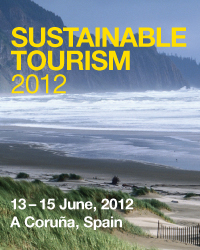
The 5th International Conference on Sustainable Tourism was held in A Coruña, Spain, organised by the Wessex Institute, UK and the Complutense University of Madrid, Spain. The meeting was sponsored by WIT Transactions on Ecology and the Environment and the International Journal of Sustainable Development and Planning. The first of these successful meetings was held in Segovia (2004), followed by Bologna (2006), Malta (2008) and the New Forest (2010).
Today tourism is an important component of development, not only in economic terms but also for knowledge and human welfare. Tourism has long ceased to be strictly just for the privileged few and nowadays is an activity accessible to a growing number of people and societies.
The phenomenon has many more advantages than disadvantages. New focus of economic development and increasing wealth of human societies developed in tourism. Our knowledge of the world now includes a strong component due to tourism, which results in the enjoyment of knowing new territories and increasing contacts with near or far away societies and cultures.
The tourism industry has nevertheless given rise to some serious problems, including social costs and ecological impacts. Many ancient local cultures have lost their identities. Their societies have orientated their economy only to this industry. Both natural and cultural landscapes have also paid a high price for certain forms of tourism. These problems will persist if short term economic benefits are the only objective in mind, leading to economic gains that eventually become ruinous.
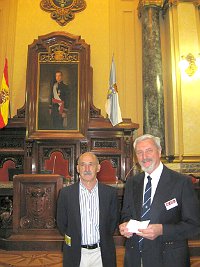
The cities are growing rapidly and industry demands increasingly larger areas with the results that many traditional rural zones are being abandoned. Tourism should also play a role in this context. Many historical agricultural districts can maintain, or even recover, their local population numbers through intelligent tourism strategists focussed on nature and culture. Natural landscapes and diversity are becoming increasingly appreciated and the tourism industry must be able to respond to these aspirations.
The delegates were invited to the City hall for the opening of the conference. There they were welcomed by the Deputy Mayor, Architect Martin Pardo, who explained the importance of A Coruña as a tourist destination and the effort that the local authorities are making to highlight the cultural and historical attractions of the town.
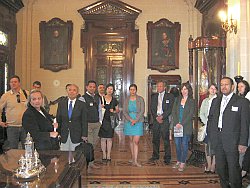
The guests were shown around the Palace after the speeches, including a series of rooms that housed a unique collection of clocks from many different periods.
Following the visit the delegates were taken to the Campus of the University of A Coruña, where Professor Santiago Hernandez, a member of Wessex Institute Board of Directors, and Professor of Civil Engineering, explained some of the research carried out at his department, including research on several bridges and other special structures that are valuable additions to the regional landscape. The bridges described by Santiago included some in different countries, as well as proposals for the Messina Bridge and one across part of the bay in A Coruña – particular attention was paid in all cases to harmonising them with their environment and landscape.
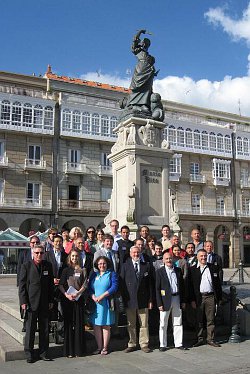
The formal sessions were opened by Professor Carlos A Brebbia, who said that the success of the series of the conferences on Sustainable Tourism is a testament to the quality of the papers, which as usual are published in book form. This includes the hard copy version as well as digital format and the archiving of all papers in the WIT library (http://library.witpress.com/) where they are permanently available to the international scientific community.
The Wessex Institute – Carlos said – is dedicated to the international dissemination of knowledge and in this regard, the conferences are an important component of the many activities of WIT. They include advanced research in computational methods and training of PhD students, plus the provision of specialised services to industry particularly in the engineering and aerospace fields. The research work of Wessex Institute is well known throughout the world and gave rise to numerous research and training agreements with different universities.
Wessex Institute is always receptive to developing new contacts with other institutions and colleges. Carlos invited the participants to visit the Wessex Institute campus in the New Forest, to better appreciate the work of WIT. The Campus has first class residential, office and training facilities, plus a single room accommodation for nearly 50 researchers.
Conference Topics
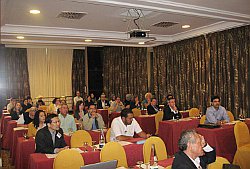 The papers presented at the conference were grouped in the following topics:
The papers presented at the conference were grouped in the following topics:
- Emergent strategies for tourism development
- Tourism strategies
- Community issues
- Tourism as a tool of development
- Environmental issues
- Art, architecture and culture
- Heritage tourism
Keynote Addresses
The papers included a series of keynotes addresses:
‘Hotel certification and its relevance for sustainable development – Examples from the European Alps’
by U Prönstl, Boku University, Vienna, Austria
‘Sustainable tourism in an urban desert’
by S Conway, Urban Environmental Research, USA
‘Revitalization measure in Suzu City based on questionnaire’
by T Oyabu, Kanazawa Seiryo University, Japan
‘Spatial regional planning for sustainable tourism in Slovenia’
by I Jurincic, University of Primorska, Slovenia
‘Operators’ attitudes on educational tourism in agriculture’
by Y Ohe, Chiba University, Japan
Conference Dinner
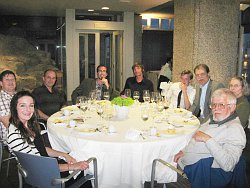
The meeting of the International Scientific Advisory Committee (ISAC) took place in another renowned restaurant, where the members had an opportunity to try some of the excellent seafood and free range beef for which A Coruña is famous. The ensuing discussions helped to define better the objectives of the conference to be reconvened in 2014. New topics were put forward as well as a series of nominations for the ISAC. The general feeling was that the conference was very successful and generated a very friendly atmosphere.
Closing of the Conference
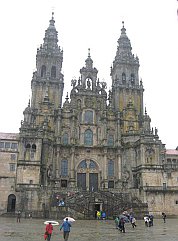
At the end of the conference the delegates were invited to take part in an excursion to Santiago del Compostela, the ancient capital of Galicia, where the Church built over the remains of St James is located. This has been a site for pilgrimage since early Christian times. The important Greater Church is surrounded by a series of historic buildings, and most beautiful squares. One of the best known sights there is the Hospital of the Catholic Kings, a hostel for pilgrimages in the past and now a renowned hotel. They also had time to roam the narrow, medieval streets of Santiago, one of the most beautiful cities in Europe.
The conference will be reconvened in 2014 in a place and at a date to be shortly announced.
Conference Proceedings
The proceedings of Sustainable Tourism, 424pp (Print ISBN:978-1-84564-594-6; eISBN: 978-1-84564-595-3) are available from WIT Press. Orders can be placed on the WIT Press web site at www.witpress.com or by email:Papers from the conference will also be hosted online at the WIT eLibrary as Volume 161 of WIT Transactions on Ecology and the Environment ISSN: 1746-448X, Digital ISSN 1743-3541). For more details visit the WIT eLibrary at http://library.witpress.com
Related Conferences
Sustainable Tourism 2024, 24–26 September 2024

 Wessex Institute
Wessex Institute